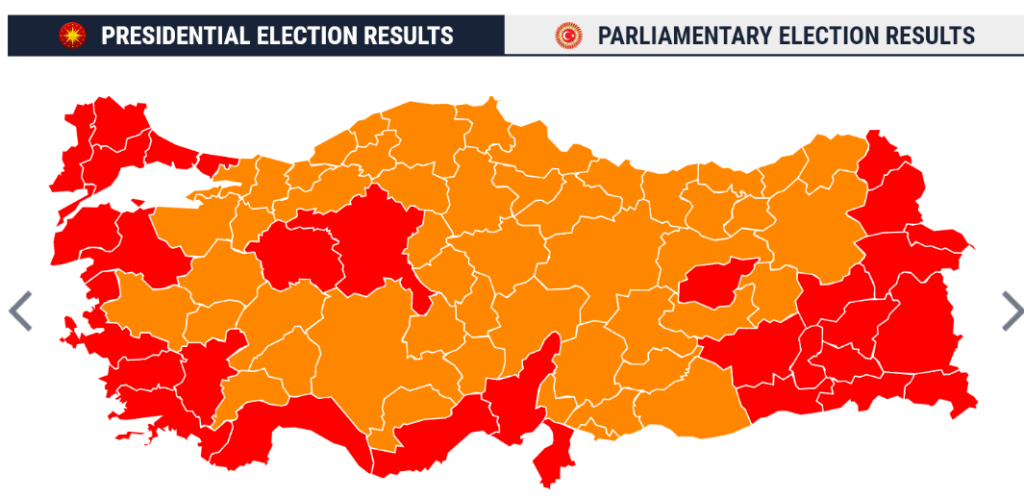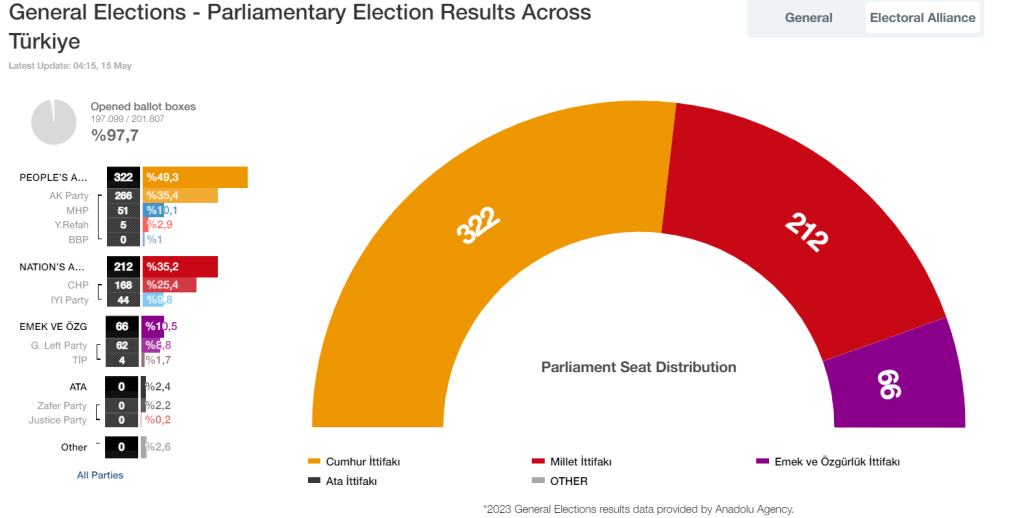
Election results have just come out from Turkey on May 14th. Incumbent President Erdogan, in power for 20 years, faced his toughest battle yet. Challenger Kemal Kilicadoglu had a strong performance in the first round, but neither candidate won a majority. Now it goes to a run-off election in two weeks. And, in looking at a parallel to the important 2019 Istanbul mayoral election, it’s premature to count out the opposition winning.
Polls had shown a slight Kilicadaroglu lead or a tie, so President Erdogan slightly outperformed the polling. Ince had dropped out right before the election. Votes from abroad received prior to his leaving the race counted - but no vote cast on election date counted.
Looking geographically, we can see that Erdogan won most of Turkey’s provinces, as he usually does. The wealthy coastal regions went as usual to the opposition. The Kurdish regions (that southeast corner) went to the opposition too- they have long opposed Erdogan. Interestingly, a couple of the earthquake hit provinces which usually vote 60-70% for Erdogan swung to the opposition. [They are the ones in the center at the southernmost tip]

Some attributed this underperformance to the fact that Mr. K is a member of a very small sect of Islam called the Alawites, which make conventional Muslim Turks uncomfortable (sort of comparable to Mormons or Jehovah’s Witness candidates in the USA). Others chalked it up to his dull campaign style.
Some other commentators attributed it to the usual mix of Erdogan strong arm tactics- throttling opposition voices on Twitter this weekend, tons of handouts to voters in the month before the election, and his usual policy of saying he represents an independent Turkey against rapacious foreign powers.
Firebrand nationalist Sinan Ogan pulled 5% of votes. His voters are slightly likelier to support Erdogan, making Erdogan the favorite to win the second run with probably 53% of the vote. That is course, if the voting data as it stands now is accurate and clean – which is being contested and is a historical weakness of the Erdogan government.
Turnout was absolutely massive, nearly 90%. Voting is mandatory in Turkey on paper, but voters often find a way out if they are unenthused. With both sides viewing this as a pivotal election, voters from all sides were motivated to vote.
Finally, Erdogan’s coalition maintained its narrow lead in Parliament, winning 322/600 seats in preliminary results. This will become important later, especially if Kilicdaroglu is President. The opposition wants to return to a Parliament led system as opposed to Erdogan’s almost unilateral Presidential system. But with Erdogan’s party in control of Parliament, it would make the initial year or two of a Parliament led system very rocky for getting anything done.

Now the election likely heads to a second round run off between the two candidates. If one side had won by 10% or more, these scenarios would have been off the table. But given the numbers here, and the rhetoric on both sides, there are several things that can happen over the next few weeks. Erdogan has shown throughout his whole career that he is a fighter and will always push for a conclusive win.
High Potential for a Recount
It’s likely that one or both candidates will call for a recount. Accusations are flying everywhere of dirty tricks. Mr. K came out and called Erdogan’s official numbers ‘a fiction’ in a tweet and called on supporters to verify everything. The official vote counting agency and Electoral Court, the YSK, had its website down as of even Monday morning Turkey time. But he called on them to verify every vote and take as long as required.

On the other side, Erdogan gave a speech Sunday night claiming victory. He implied that the votes from today should be enough for a first wound win, but it may require a second round. He may attempt a recount in order to push his total over 50% through various means (fake ballots, disqualified opposition ballots or precincts, etc.) to avoid the run-off.
Many other opposition figures were up in arms. They claimed that Erdogan was putting out fake numbers to the press, and hiding the real numbers, to try and claim an election night win. They claimed that officials were suspending the counting of opposition ballots multiple times to generate an artificially high Erdogan lead. Users on Twitter posted what they claimed was ballot stuffing type activities by AK Party, Erdogan’s party, officials.

All of this will surely see one or both sides press for a recount. We think all of this will be battled over in the press in coming days, and potentially in the courts too.
If for some reason it can be resolved then the second round will occur on May 28th. If not, it may have to be deferred for several highly fraught weeks.
The Important 2019 Parallel
Many readers are wondering how this could play out. One potential we should look at is the last nail biter election in Turkey – the Istanbul mayoral race of 2019. This is the second most important political position in Turkey, as Istanbul contains over 20% of the population of Turkey and has almost 40% of the GDP. It also is a swing district which switches sides frequently.
The night of the March 2019 election, Erdogan’s candidate claimed a lead and demanded the opposition concede. The opposition said they possessed records of votes, at that time uncounted in the official vote system, showing they had won by 30,000 votes. The data was updated the next day and confirmed they were right. This new final data saw Erdogan’s candidate get 48.6%, and the opposition candidate 48.8%, with the remainder by third party candidates.
Then team Erdogan panicked over the loss. Erdogan’s government dragged this through multiple agencies, starting investigations into the ‘irregularities’. They did recounts. The Supreme Electoral Court for a mysterious reason rejected the final numbers. Popular opposition grew, and demanded a new clean run-off election. Turkish voters were tired of the games, and voted strongly in favor of the opposition candidate. He won by 54.2% to 45% and is now the most popular politician in the country.
What’s the lesson here? The 2019 parallel suggests we could see four potential things in coming days. One, the precedent has been established for the government to initially overcount Erdogan support and declare victory, and discount opposition support. Secondly, the CHP was able to produce data to correct the totals and increase its support. Then this can get tied up in courts and administrative investigations that took almost three months in 2019. Finally, we get a new first round or a cleaner second round election.
We recognize that the margin between the two candidates is much wider than in 2019’s election. We also acknowledge that there is a third party candidate who could push his voters one or the way or the other for a host of political or personal reasons. If the existing data is reasonably clean and does not see huge modifications, Erdogan can be expected to win by 2-5% points in the second round.
But the most likely outcome of a 2019 type scenario would be a resounding defeat of President Erdogan. Although he undoubtedly is personally popular among many swathes of the population, Turks are more in favor of a non-rigged system.
Subscribe to our evening newsletter to stay informed during these challenging times!!